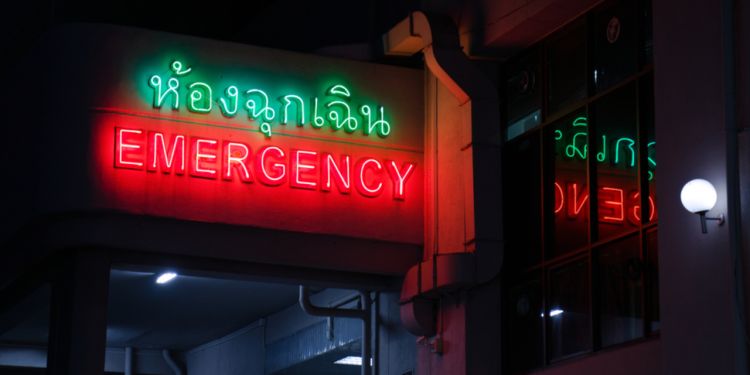
Thailand is one of the safest countries in Southeast Asia. Crime rates are low. Society favors social harmony. People are tolerant of outsiders, and the country doesn't experience many natural disasters. That said, accidents and emergencies do happen. If you experience one while living in or visiting Thailand, this guide will show you how to handle the mishap, whether big or small.
Emergency phone numbers in Thailand
Thailand offers many emergency services. It's a good idea to save these numbers on your phone or print them out, laminate them, and keep them in your wallet or purse. This way, you'll be prepared if you have an accident or emergency.
- Police: 191;
- Tourist police: 1155;
- Ambulance: 1669;
- Private ambulance: 1724 or 1719;
- Poison control center: 1554;
- Fire department: 199;
- Highway police: 1193.
It's also a good idea to set an emergency contact on your phone's lock screen so that if you're incapacitated, emergency responders will know who to reach.
Medical emergencies in Thailand
If you have a non-life-threatening medical emergency in Thailand, you're better off finding a way to a hospital rather than calling for an ambulance, especially if you're in Bangkok. Because of traffic, an ambulance could take well over 15 minutes to reach you.
You have a few different places you can visit depending on your budget or the type of health insurance you have. In either case, your options from least expensive to most expensive are:
- local clinics;
- government hospitals;
- premium clinics;
- private hospitals.
For life-threatening medical emergencies, you should call an ambulance at 1669. You can opt for a private ambulance over a standard ambulance by calling 1724 or 1719. Private ambulances charge more, but that gives them the incentive to quickly reach you. Private ambulance service in Thailand costs between 5,000 and 50,000 Thai Baht, depending on how far they need to travel and what kind of care they need.
Car accidents in Thailand
If you're involved in a car accident in Thailand, you have to follow some basic guidelines. Firstly, always keep the car where it is. Secondly, never dispute who is at fault. Most people in Thailand avoid confrontation. Instead, follow step three – call your insurance or rental car company and let them know what happened. They will send a rep to the scene who will argue on your behalf.
Fourthly, if someone is injured, call the police at 191 or highway police at 1193 and ambulance at 1669. However, don't be surprised if it takes a police officer a while to show up for non-life-threatening accidents. Minor car accidents aren't a top priority in Thailand. In fact, if no one is injured, you don't even have to call the police.
Lastly, wait for the insurance agents to arrive. They will inspect the scene and issue an accident report. You can then use that report to make a claim for any personal injuries (if you're whisked away to the hospital) or damage to your car.
Reporting a crime in Thailand
If you're the victim of theft, assault, or rape – all of which rarely happens to foreigners in Thailand – you should call the police at 191, flag down the nearest police officer, call the tourist police at 1155, or go to the nearest police station.
When you know the person who committed the crime and want to take legal action, you have to file a police report at the local police station to press charges. Then, you must go through the Thai court system, which can be time-consuming and costly. For this reason, many people in Thailand try to dispute minor legal issues outside of the courts.
If you don't know who committed the crime against you, the police will investigate. However, because of the laid-back approach to policing in Thailand, you can't always expect a thorough follow-up. So, you may have to hire a private investigator if the matter is serious.
Floods and power outages in Thailand
Thailand often floods during the rainy season from May to October, and this can cause a lot of power outages. These outages can last anywhere from minutes to hours. But if they continue for more than a day, it's best to contact your provincial electric company.
Most provincial electric companies, however, don't list emergency contact numbers to report power outages. So you'll have to go through their customer service numbers. If you live in Bangkok, you can monitor power outages on the Metropolitan Electric Authority's website.
Snake and mosquito bites in Thailand
Snake bites rarely happen in Thailand unless someone is deep in the forest or jungle, but if you happen to get bit by a snake, your safest bet is to go to the emergency room at the nearest hospital. Most hospitals in Thailand stock antivenom for local venomous snakes.
If you get bit by a snake in or close to Bangkok, get to Chulalongkorn Hospital as soon as possible. Chulalongkorn is the leading hospital for snake bites and carries antivenom for all venomous snakes in Southeast Asia. It is also well-equipped to deal with a variety of non-venomous snake bites.
As for mosquitoes, the tiger variation in Thailand does carry the dengue virus – and you don't have to be in the countryside to get it. People in Bangkok get dengue fever all the time. If you get a fever, muscle pain, rash, or joint aches after getting bit by a mosquito, get to a hospital so you can have blood tests done.
Whether you're bit by a snake or suspect you have the dengue virus, some of the other top hospitals you can go to are:
Box jellyfish in Thailand
Whether swimming, scuba diving, snorkeling, or taking part in any other water activity at Thailand's beaches, you have to watch out for venomous box jellyfish from May to October, the country's rainy season.
Box jellyfish stings can be painful and even fatal, so if you get stung, seek immediate medical attention. The easiest thing to do is run to one of the local food stands on or near the beach. They'll usually have vinegar, which you can douse the jellyfish sting with to counter the venom. That should buy you enough time to get to a hospital. If vinegar isn't readily available, get to the nearest hospital as soon as possible.
Getting arrested in Thailand
Of all the emergencies in this guide, getting arrested in Thailand is probably the least likely thing to happen to you while living or visiting Thailand. That said, things happen. If you ever find yourself in police custody, you do have the right to remain silent in Thailand. Also, you should never sign any paperwork if you can't understand what it says. And always call a lawyer who can speak Thai and your native language.
You should also contact your embassy and let them know you've been arrested. Although they can't offer legal advice or intervene on your behalf, they can give you a list of numbers for reputable lawyers in Thailand.
Important:
We do our best to provide accurate and up to date information. However, if you have noticed any inaccuracies in this article, please let us know in the comments section below.











